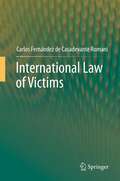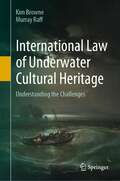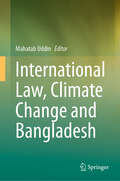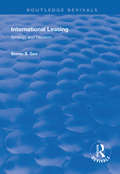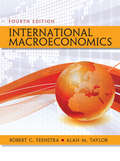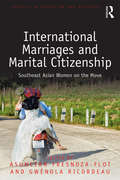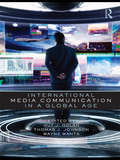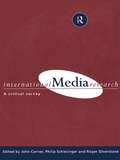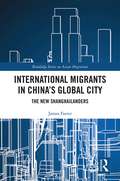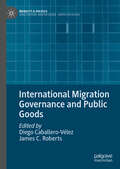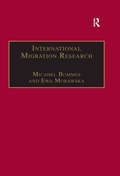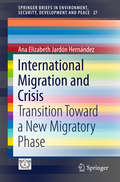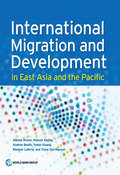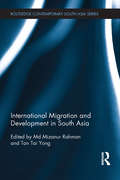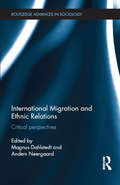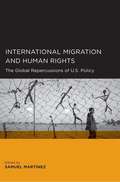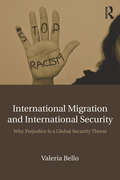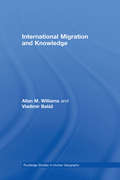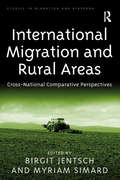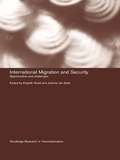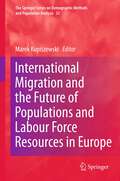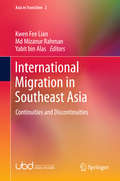- Table View
- List View
International Law of Victims
by Carlos Fernández de Casadevante RomaniAfter having ignored victims, only recently both domestic and international law have begun to pay attention to them. As a consequence, different international norms related to victims have progressively been introduced. These are norms generally characterized by a certain concept from the perspective of victims, as well as by the enumeration of a list of rights to which they are entitle to; rights upon which the international statute of victims is built. In reverse, these catalogues of rights are the states' obligations. Most of these rights are already existent in the international law of human rights. Consequently, they are not new but consolidated rights. Others are strictly linked to victims, concerning the following categories: victims of crime, victims of abuse of power, victims of gross violations of international human rights law, victims of serious violations of international humanitarian law, victims of enforced disappearance, victims of violations of international criminal law and victims of terrorism.
International Law of Underwater Cultural Heritage: Understanding the Challenges
by Kim Browne Murray RaffThis book brings together three distinct areas of International Law – namely Environmental, Heritage and Ocean Law – to address the international legal protection of historically significant wrecks, with particular focus on the environmental hazards they may pose. The confluence of Heritage Law and the Law of the Sea with International Environmental Law represents an important development in international governance strategies for the twenty-first century, in particular those legal and administrative regimes that concern the world’s oceans and underwater cultural heritage protection. Importantly, connections between international legal regimes, such as the 1982 Law of the Sea, and institutions like the International Maritime Organisation (IMO) and United Nations Education Scientific Cultural Organisation (UNESCO), can play a crucial part in governance strategies that involve the regulation of marine pollution and historic shipwrecks.
International Law, Climate Change and Bangladesh
by Mahatab UddinThis book explores the possibilities and scope of facilitating Bangladesh’s battle against climate change with regard to relevant international legal instruments, as well as national laws and policies. The Post-Paris global climate regime considers adaptation, mitigation, climate finance, technology transfer, capacity building, and compensation for losses and damage associated with climate change as essential tools for combating it. This book includes chapters on each of the above topics. Additionally, it covers integrating digital technologies in climate-smart agricultural practices, government land acquisition practices and their repercussions on changing land conditions, the legal landscape overseeing climate change and foreign direct investment, and the regulatory interplay between domestic trade and climate policies in Bangladesh. The book comprehensively covers climate justice issues by addressing climate-induced migration, access to clean water, gender-responsive climate action, public interest environmental litigation, and, above all, the climate-change-development nexus in Bangladesh. This book is intended for researchers, policymakers, university students, and practitioners in international environmental law and climate change law.
International Leasing: Strategy and Decision (Routledge Revivals)
by Simon S. GaoFirst published in 1999, This book aims to study international leasing, in which it mainly looks at leasing on an international scale; considering how we define leasing itself and in the context of the international financial world.
International Macroeconomics (Fourth Edition)
by Robert C. Feenstra Alan M. TaylorDeveloped in the classroom by two of the most prominent researchers in the field, Feenstra and Taylor’s International Economics uses engaging applications to provide a modern view of the global economy for a modern audience. Most international economics textbooks emphasize theory and the economies of advanced countries. Feenstra and Taylor combine theoretical coverage with empirical evidence throughout, while reflecting the realities of the global economy by covering emerging markets and developing countries (India, China, Southeast Asia). The new edition has been thoroughly updated to include new data and Applications, as well as many new Headlines to reflect the rapid changes in international economics during the last three years. The 4th Edition includes the latest on opening relations with Cuba, immigration and Europe’s refugee crisis, the effect of NAFTA on wages and employment, job polarization, quicksourcing, China’s problems, and the debate in Britain about leaving the European Union.
International Management in China: Cross-Cultural Issues (Routledge Advances in Asia-Pacific Business #Vol. 7)
by Jan SelmerThe greatest challenge to international business today is how to manage business operations across cultural boundaries. This is especially true in the case of China, which has attracted a massive amount of foreign investment and international trade recently. This new study examines three main themes:* the partnership of management through joint ventures* the human resource aspects of management* the management of communication, co-operation and negotiationThe crucial issue of trustworthiness, the different managerial practices in China and the West, the importance of being well prepared and understanding Chinese negotiations are the major contemporary issues identified and discussed in this book.
International Maritime Transport: Perspectives (Routledge Advances in Maritime Research)
by Heather Leggate James McConville Alfonso MorvilloThe importance of the international maritime transport industry is difficult to overstate. This new book presents an interdisciplinary approach from a wide range of internationally-based experts. International Maritime Transport represents a radical departure from previous works in its structure and approach. The section editors each discuss the state of the art in the opening chapter, before introducing a selection of works providing a wide-ranging analysis of the subject. Wide discretion of approach has provided literary freedom for individual opinion and analysis within the overall framework: this permits a level of innovation which is perhaps stifled by the more standardized model. Whilst each perspective can be seen as exclusive, together they form a comprehensive volume of issues in contemporary maritime transport. Topics covered include: ports as interfaces, logistics, manpower and skills, financial risk and opportunities, the regulatory framework. Each chapter contains an introduction which explains the context of the chapter within the book and the contemporary state of the art. Under the editorship of maritime experts James McConville, Alfonso Morvillo and Heather Leggate, the book is sure to be of interest to students and academics working on maritime studies, as well as being useful to professionals and policy makers in the maritime industry.
International Marriages and Marital Citizenship: Southeast Asian Women on the Move (Studies in Migration and Diaspora)
by Asuncion Fresnoza-Flot Gwénola RicordeauWhile marriage has lost its popularity in many developed countries and is no longer an obligatory path to family formation, it has gained momentum among binational couples as states reinforce their control over human migration. Focusing on the case of Southeast Asian women who have been epitomized on the global marriage market as ‘ideal’ brides and wives, this volume examines these women’s experiences of international marriage, migration, and states' governmentality. Drawing from ethnographic research and policy analyses, this book sheds light on the way many countries in Southeast Asia and beyond have redefined marriage and national belonging through their regime of ‘marital citizenship’ (that is, a legal status granted by a state to a migrant by virtue of his/her marriage to one of its citizens). These regimes influence the familial and social incorporation of Southeast Asian migrant women, notably their access to socio-political and civic rights in their receiving countries. The case studies analysed in this volume highlight these women’s subjectivity and agency as they embrace, resist, and navigate the intricate legal and socio-cultural frameworks of citizenship. As such, it will appeal to sociologists, geographers, socio-legal scholars, and anthropologists with interests in migration, family formation, intimate relations, and gender.
International Media Communication in a Global Age (Routledge Communication Series)
by Wayne Wanta Thomas J. Johnson Guy J. GolanThis volume provides a comprehensive examination of key issues regarding global communication, focusing particularly on international news and strategic communication. It addresses those news factors that influence the newsworthiness of international events, providing a synthesis of both theoretical and practical studies that highlight the complicated nature of the international news selection process. It also deals with international news coverage, presenting research on the cross-national and cross-cultural nature of media coverage of global events, in the interdisciplinary context of research on political communication, war coverage, new technologies and online communication. The work concludes with a focus on global strategic communications: in the age of globalization, global economies and cross-national media ownership, chapters here provide readers with some of the most up-to-date research on international advertising, public relations and other key issues in international communications. With contributions from many of the leading scholars in the field of international media communication research, this collection presents a valuable resource for advancing knowledge and understanding of the complicated international communication phenomenon. It will be of value to upper-level undergraduates and graduate students in mass media and communication programs, and to scholars whose research focuses on global communication research.
International Media Research: A Critical Survey
by Roger Silverstone Philip Schlesinger John R. Corner Professor Philip SchlesingerInternational Media Research offers a rigorous and critical review of key approaches and concerns that have recently defined the field of media research. In this clearly argued collection of essays, the contributors analyze and reflect upon dominant themes and debates that have made media research an increasingly important element of cultural theory. The volume begins with a critical evaluation of the work of the leading media scholar, Elihu Katz, and continues with an exploration of the relationship between media studies and adjacent disciplines: cultural studies and gender and sexuality.Contributors drawn from Britain, America, Canada and Belgium consider the relationships between media research and media policy in different national and international contexts. Focusing on the European Union, East-Central Europe, North America and Latin America, chapters assess the impact of social, economic and political circumstances on policy debates and the shaping of the research agenda. The final chapter adopts a transatlantic perspective in tracing and analysing the history of the media's role in reporting war.
International Migrants in China's Global City: The New Shanghailanders (Routledge Series on Asian Migration)
by James FarrerLong a source of migrants, China has now become a migrant destination. In 2016, government sources reported that nearly 900,000 foreigners were working in China, though international migrants remain a tiny presence at the national level. Shanghai is China’s most globalized city and has attracted a full quarter of Mainland China’s foreign resident population. This book analyzes the development of Shanghai’s expatriate communities, from their role in the opening up of Shanghai to foreign investment in the early 1980s through to the explosive growth after China joined the World Trade Organization in 2000. Based on over 400 interviews and 20 years of ethnographic fieldwork in Shanghai, it argues that international migrants play an important qualitative role in urban life. It explains the lifestyles of Shanghai’s skilled migrants; their positions in economic, social, sexual and cultural fields; their strategies for integration into Chinese society; their contributions to a cosmopolitan urban geography; and their changing symbolic and social significance for Shanghai as a global city. In so doing, it seeks to deal with the following questions: how have a generation of migrants made Shanghai into a cosmopolitan hometown, what role have they played in making Shanghai a global city, and how do foreign residents now fit into the nationalistic narrative of the China Dream? Addressing a gap in the market of critical expatriate studies through its focus on China, this book will be of interest to academics in the field of international migration, skilled migration, expatriates, urban studies, urban sociology, sexuality and gender studies, international education, and China studies.
International Migration Governance and Public Goods (Mobility & Politics)
by James C. Roberts Diego Caballero-VélezThis edited volume will take an expansive view of the “publicness” of both the policies and the effects related to migration, immigration, and refugees. It will include examinations of international systemic factors and local economic factors. Because migration governance varies geographically, the book will be organized by region. It will include chapters on Africa; Australia; New Zealand and the Pacific Islands; Europe; North America; and SouthAmerica. The book will be focused on how public goods theory provides deep understanding of the factors that affect migration governance and on how understanding the public goods nature of migration governance can help develop effective policies for addressing these problems.
International Migration Research: Constructions, Omissions and the Promises of Interdisciplinarity (Research in Migration and Ethnic Relations Series)
by Ewa MorawskaThe centrality of international migration as a process articulating major transformations of contemporary societies offers an opportunity to make it the shared component of the theoretical and research agendas of the social science disciplines. In this volume a multidisciplinary team of authors presents a stocktaking account of current research on international migration in order to lay the ground for such an interdisciplinary collaboration. The first part of the book scrutinizes the theoretical concepts and interpretative frameworks that inform migration research and their impact on empirical studies in selected disciplines. The next two sections examine the epistemological premises underlying migration research in different fields of the social sciences and the challenges of 'informed translations' between these approaches. The final section considers the interdependency between the academic study of migration and the social and political contexts in which it is embedded. The book invites researchers to address the challenges raised by the empowerment of migration research, offering ways of communicating across different specializations and guiding readers towards a meaningful interdisciplinarity.
International Migration and Crisis
by Ana Elizabeth Jardón HernándezThis book presents an analysis of the various transformation processes at work in the international migratory dynamic of Mexicans as a consequence of the 2008 international economic crisis and the implementation of an increasingly strict American migration policy. Employing a methodology that combines qualitative and quantitative tools, the main findings of this work indicate that the international migration of Mexicans is moving towards a new phase, an era of "contraction and disengagement" that is characterized by the confluence of multiple changes with repercussions on the functioning of international migration as a socioeconomic strategy at the family and migrant community levels.
International Migration and Development in East Asia and the Pacific
by Yukon Huang Manolo Abella Andrew Beath Manjula Luthria Ahmad Ahsan Trang Van NguyenThe East Asia and Pacific (EAP) region has an international emigrant population of more than 21 million people who remitted US$112 billion to their home countries in 2013. The region also hosts more than 7 million migrant workers, mostly from other Asian countries. These migrant workers account for 20 percent or more of the labor force in economies such as Malaysia and Singapore and thus play a significant role in the economies of the labor-receiving countries. An aging population in many East Asian countries will create significant labor shortages, leading to greater demand for migrant workers. For these reasons, international labor mobility is emerging as an important development issue in East Asia, with important implications for reducing poverty and supporting sustainable economic development in the region. In this context, International Migration and Development in East Asia and the Pacific analyzes the impact of migration on development of the EAP region and examines how international migration should be managed in East Asia in a way that supports development goals while simultaneously protecting the rights of migrants. The study covers trends in international migration in East Asia and overarching regional issues such as the links between macroeconomic management and remittances and the role of demographic trends in migration; the economic impact of migration and remittances on labor-sending countries and labor-receiving countries; the migration industry; and the policies and institutions that govern migration. This report shows that in labor-sending countries remittances help reduce poverty significantly by increasing income for migrants' families. At the country level, remittances have a significant role in helping finance trade deficits and in bolstering reserves, not only in the small Pacific Island economies but also in large economies such as Vietnam and the Philippines. For labor-receiving countries, such as Malaysia, Singapore, and Hong Kong SAR, China, migrant workers form a significant part of the workforce, especially in labor-intensive manufacturing, construction, plantation agriculture, fishing, and household services. Migrant workers thus help relieve labor shortages, boost output, and maintain competitiveness. The role of migrant workers will become more important in the future given the rapid population aging in many labor-receiving East Asian countries. Given these factors, the key question concerning international migration in East Asia and the Pacific is not whether it is desirable but how it should be managed in the future. International Migration and Development in East Asia and the Pacific discusses a range of policy options in both labor-sending and labor-receiving countries to address this question.
International Migration and Development in South Asia (Routledge Contemporary South Asia Series)
by Md Mizanur Rahman Tan Tai YongIn migration studies, the nexus between migration and development in the global South has been meticulously debated. However, a unanimous resolution to this debate has not been found, due to the ever-changing nature of international migration. This book advances knowledge on the global debate on the migration-development relationship by documenting experiences in a number of countries in South Asia. <P><P>Drawing on the experiences of global South Asians, this volume documents the impact of migration on the social, economic, and political fields in the broader context of development. It also presents a regional experience by looking into the migration-development nexus in the context of South Asia, and analyses the role South Asian migrants and diaspora communities play in the South Asian society. Contributions from a variety of disciplinary backgrounds, including sociology, anthropology, political science, international relations and economics, document the development implications of South Asian migration. Broad in scope in terms of contents, timeline of migration, and geographical coverage, the book presents empirically-based case studies involving India, Bangladesh, Sri Lanka, Pakistan, and Nepal and their emigrants living and working in different parts of the world. <P><P>Going beyond reporting the impacts of migration on economic development by highlighting the implications of ‘social development’ on society, this book provides a fascinating contribution to the fields of Asian Development, Migration Studies and South Asian Studies.
International Migration and Ethnic Relations: Critical Perspectives (Routledge Advances in Sociology)
by Magnus Dahlstedt Anders NeergaardEach day, in so many aspects of daily life, we are reminded of the significance of migration and ethnicity. This book is a critical contribution to the understanding of the phenomena of migration and ethnicity, from a Swedish vantage point looking outwards towards a European context. It presents current academic debates and gives a theoretical overview of nine key concepts in the field of ethnic and migrations studies, but it also exemplifies how these concepts could be used in analysing specific empirical cases. It explores the following concepts: ethnicity; migration; diaspora; citizenship; intersectionality; racism; right wing populism; social exclusion; and informalisation. The book is interdisciplinary, embracing areas such as labour studies, economic history, ethnicity, business administration, gender studies, literature studies, economics, educational science, social anthropology, social work, sociology and political science.
International Migration and Human Rights: The Global Repercussions of U.S. Policy
by Samuel MartínezThis book contains essays divided into four sections, each section developing a different angle on the repercussions of U.S. policy for the rights of migrants at different points in history and in various parts of the world.
International Migration and International Security: Why Prejudice Is a Global Security Threat
by Valeria BelloThrough an interdisciplinary analytic lens that combines debates emerged in the fields of international relations, political science and sociology, Valeria Bello reveals how transnational dynamics have increased extremism, prejudiced attitudes towards others and international xenophobia. Bello begins her analysis by tracing similarities between Europe today and Europe before World War II to explain why prejudice is a global security threat and why it is arising as a current global concern within International Organizations. In such a light, Bello shows how changes in the International System and the attack on the UN practice of Intercultural Dialogue have become sources of new perceived threats and the reasons for which new exclusionary patterns have arisen. She argues that both those outcomes have been exacerbating the perceived clash of civilizations and the root causes of different fashions of extremisms. Bello concludes by portraying alternative ways to deal with these instabilities through a partnership of the different stakeholders involved, including both state and non-state actors at global, regional, national and local levels. International Migration and International Security provides a unique crosscutting angle from which to analyze the current socio-political crisis connected to the theme of international migration that the world is currently witnessing. Bello expertly shows that different paths for the world are possible and suggest ways to further promote Global Human Security through local, national, regional and global practices of Intercultural Dialogue.
International Migration and Knowledge (Routledge Studies in Human Geography)
by Allan Williams Vladimir BalážTwo unconnected but important recent academic and policy debates have focussed on the idea of the knowledge-based economy and the economic consequences of increasing international migration. This book challenges pre-conceived views on the debates and argues the need to understand that all migrants are potentially knowledge carriers and learners, and that they play an essential role in the globalization of knowledge transactions. Deconstructing the concept of knowledge, and demonstrating how tacit knowledge is in fact an amalgam of encultured and embrained/embodied forms of knowledge this book considers how international migration has profound consequences, analysed, first, in terms of the economic and immigration strategies of national and regional bodies. And, secondly, the authors explore how the ‘diversity dividend’ of migration is captured by firms through their management strategies, and by individuals through increasingly boundaryless careers, continuous learning and transnational working lives. This research is a highly original contribution which provides the first overview of one of the most dynamic forces for change in the globalising economy. It will challenge migration researchers and students to engage with the management and learning literatures, and it will challenge management and economic policy analysts to think through the role of international migration. As such it will contribute to teaching and research in a range of social science disciplines, as well as to those involved in policy arenas ensuring that firms and all migrants engage in mutual learning and knowledge sharing.
International Migration and Rural Areas: Cross-National Comparative Perspectives (Studies in Migration and Diaspora)
by Myriam SimardWhile immigrants are still predominantly choosing urban areas to locate to, there is now increasing evidence of immigration to rural areas which poses its own challenges for those relocating, from the scarcity of high quality jobs to the provision of public and private services. Addressing the shortcomings in current research, this book employs an innovative approach by exploring this relationship from a cross-national, comparative, global perspective. It draws lessons from case studies across a range of geographical and political contexts, including Canada, the USA, Ireland, Scotland, Greece and Russia. Bringing together migration experts from a range of academic disciplines, International Migration and Rural Areas contributes to conceptual developments and also identifies policy concerns which can be pursued at national, sub-national and supra-national levels. As such, it will appeal to policy makers, as well as scholars across a range of disciplines, including geography, politics, demography, social policy, sociology and anthropology.
International Migration and Security: Opportunities and Challenges (Routledge Research in Transnationalism)
by Elspeth Guild Joanne Van SelmEvery day newspapers in the Western world carry articles about illegal immigrants, asylum seekers and other migrants. The focus of these articles varies greatly from migrants as a threat to one or another important social or societal interest, to migrants as an important asset to those same interests. The tone is most often emotional - whichever way the focus goes. The overall impact is to confuse: is migration good or bad? In this book Guild and van Selm seek to investigate these value assessments regarding migrants in Europe, the USA, Canada and Australia. While looking at issues such as security, human rights, legal systems, identity, racism, welfare, health and labour, the authors also respond to critics of immigration.
International Migration and the Future of Populations and Labour in Europe
by Marek KupiszewskiThe changes of populations are determined by fertility, mortality and migration. On the national level, international migration is a factor of increasing demographic, economic, social and political importance. This book addresses the debate on the impact of international migration and economic activity on population and labour force resources in future. It presents a study conducted for 27 European countries, looking 50 years ahead (2002-2052). An extended discussion of theories and factors underlying the assumed evolution of the components of change and economic activity is included as well as a detailed analysis of the historical trends. These theoretical and empirical considerations lead to defining scenarios of future mortality, fertility, economic activity and international migration, which have been fed into a projection model, producing various future population dynamics and labour force trajectories. In addition, simulations have been made to estimate the size of replacement migration needed to maintain selected demographic and labour market parameters in the countries of Europe. The results presented in this book allow researchers, governments and policy makers to evaluate to what extent various migration and labour market policies may be instrumental in achieving the desired population and labour size and structures. The secondary purpose of this volume is to reveal the methodology and argumentation lying behind a complex population forecasting and simulation exercise, which is not done frequently, but is critical for the assessment of the forecasts and also valuable from a purely didactic point of view.
International Migration in Cuba: Accumulation, Imperial Designs, and Transnational Social Fields
by Alejandro Portes Margarita Cervantes-RodríguezSince the arrival of the Spanish conquerors at the beginning of the colonial period, Cuba has been hugely influenced by international migration. Between 1791 and 1810, for instance, many French people migrated to Cuba in the wake of the purchase of Louisiana by the United States and turmoil in Saint-Domingue. Between 1847 and 1874, Cuba was the main recipient of Chinese indentured laborers in Latin America. During the nineteenth century as a whole, more Spanish people migrated to Cuba than anywhere else in the Americas, and hundreds of thousands of slaves were taken to the island. The first decades of the twentieth century saw large numbers of immigrants and temporary workers from various societies arrive in Cuba. And since the revolution of 1959, a continuous outflow of Cubans toward many countries has taken place—with lasting consequences.In this book, the most comprehensive study of international migration in Cuba ever undertaken, Margarita Cervantes-Rodríguez aims to elucidate the forces that have shaped international migration and the involvement of the migrants in transnational social fields since the beginning of the colonial period. Drawing on Fernand Braudel’s concept of longue durée, transnational studies, perspectives on power, and other theoretical frameworks, the author places her analysis in a much wider historical and theoretical perspective than has previously been applied to the study of international migration in Cuba, making this a work of substantial interest to social scientists as well as historians.
International Migration in Southeast Asia
by Kwen Fee Lian Md Mizanur Rahman Yabit Bin AlasThis book is a collection of work by migration scholars and researchers who are actively conducting fieldwork in Southeast Asia. It presents a wide variety of current research and approaches the field of international labor migration from a regional perspective, acknowledging that the migration process goes beyond local and national boundaries and is embedded in regional and global interconnections. The chapters capture the complexity and richness of the migration phenomenon and experience, which manifests itself in a multitude of ways in a region well known for its diversity. The collection highlights the continuities and discontinuities in the linkages that have been forged through the movement of people between sending and receiving societies. Such linkages are explained by distinguishing between migration that has been sustained by a colonial past and migration that has been precipitated by globalization in the last two decades. The diversity of issues in the region covered by this volume will encourage a rethink of some of the conventional views of migration scholarship and result in a more critical reflection of how we approach migration research.
